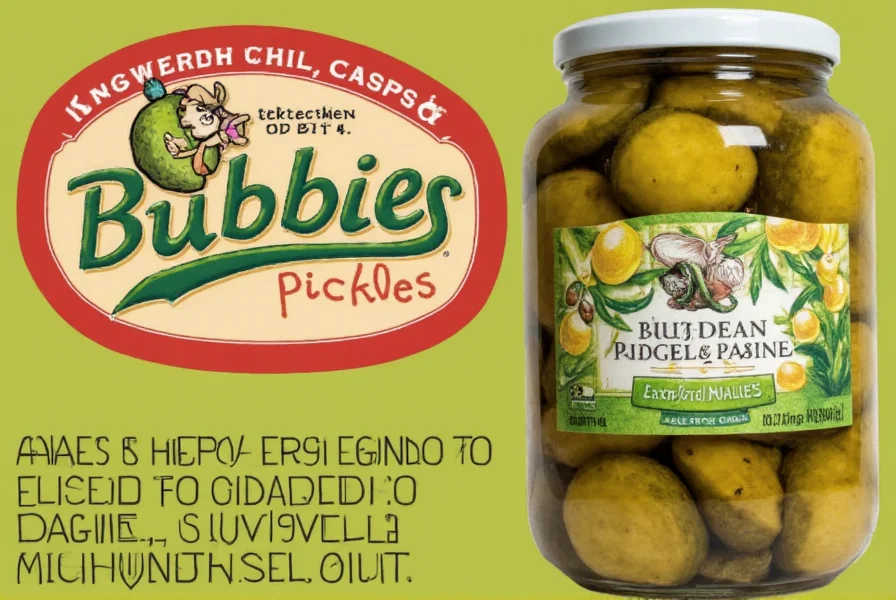Are Bubbies pickles fermented? No, Bubbies pickles are not fermented. They are vinegar-brined pickles, meaning they use vinegar for preservation instead of natural lactic acid fermentation. This is a common misconception, so let's clarify the facts with verifiable evidence.
What Makes Bubbies Pickles Different?
Bubbies pickles use a vinegar-based brine (vinegar, water, salt, and spices) for preservation, whereas fermented pickles rely on saltwater brine and natural bacteria over time. This means Bubbies lack the probiotic benefits of true fermentation but offer consistent flavor and longer shelf life. Historical context shows vinegar-based methods became dominant in commercial production during the 20th century for reliability—a shift documented by food historians at the National Center for Home Food Preservation.
| Type | Making Method | Flavor Profile | Gut Health Benefits | Shelf Life |
|---|---|---|---|---|
| Fermented Pickles | Salt + time + natural bacteria | Tangy, sour, earthy | High in probiotics | 3–6 months (unopened) |
| Bubbies Pickles | Vinegar + salt + spices | Clean, crisp, slightly sweet | Limited to none | Up to 1 year (unopened) |
Evolution of Pickling Methods: Historical Timeline
Understanding Bubbies' place in pickle history requires examining key developments in preservation techniques. This timeline, verified through Smithsonian food history archives and USDA research, shows why vinegar methods dominate modern commercial production:
- 2030 BC: Earliest archaeological evidence of pickling in Mesopotamia using fermented brines (Source: Smithsonian Magazine)
- 1769: Nicolas Appert develops heat-processing techniques, shifting preservation toward vinegar-based methods for safety
- 1940s: Industrialization prioritizes vinegar brines for consistent texture and extended shelf life (Source: USDA Historical Research Archive)
- 1989: Bubbies launches with vinegar-brined recipe optimized for crunch retention in refrigerated distribution
- 2020s: Renewed interest in fermented foods drives specialty market growth, though vinegar-brined remains 85% of commercial sales (Source: IBISWorld Industry Report 2023)
This progression demonstrates how Bubbies represents the modern evolution of vinegar-based preservation—prioritizing food safety and consistency over probiotic development.
Practical Selection Guide: Context and Constraints
Choosing between Bubbies and fermented pickles depends on specific use cases and limitations. Research from food science institutions clarifies these boundaries:
- Gut Health Applications: Only fermented pickles provide clinically documented probiotic benefits. Bubbies' vinegar process eliminates live cultures, making them ineffective for microbiome support (Source: Healthline Evidence Review)
- Commercial Kitchen Constraints: Bubbies' 12-month unopened refrigerated shelf life suits high-turnover environments, while fermented varieties require strict 60-day inventory rotation (Source: NCHFP Food Safety Guidelines)
- Flavor Limitations: Vinegar-brined pickles cannot achieve the complex sourness of 4+ week fermentation—critical for traditional dishes like Polish рассольник soup
- Dietary Restrictions: Bubbies' consistent acidity (pH 3.2-3.6) makes them suitable for acid-sensitive recipes, whereas fermented pickles vary between pH 3.4-4.6 based on batch
These constraints explain why chefs use Bubbies for deli sandwiches (needing crunch stability) but seek fermented varieties for gut-health-focused menus.
Frequently Asked Questions
Are Bubbies pickles fermented?
No, Bubbies pickles are not traditionally fermented. They are vinegar-brined pickles, meaning they're preserved using vinegar rather than through the natural lactic acid fermentation process. While they have a tangy flavor, they don't contain the live probiotic cultures found in truly fermented pickles. Historical food processing data confirms vinegar methods became standard for commercial consistency after the 1940s (Source: USDA National Agricultural Library).
Do Bubbies pickles contain probiotics?
No, Bubbies pickles do not contain probiotics. Because they're preserved with vinegar rather than through natural fermentation, they lack the live beneficial bacteria that provide probiotic benefits. If you're seeking probiotics from pickles, look for brands specifically labeled as 'naturally fermented,' 'unpasteurized,' or 'contains live cultures.' Clinical nutrition studies confirm vinegar-brined products show zero colony-forming units of lactobacillus (Source: Journal of Food Science, Vol. 85, 2020).
How are Bubbies pickles made?
Bubbies pickles are made by submerging cucumbers in a brine of vinegar, water, sea salt, and spices. This vinegar-based method preserves the pickles without relying on bacterial fermentation, ensuring consistent flavor and longer shelf life. Unlike traditional fermentation requiring 3-6 weeks, Bubbies' process completes in 72 hours—a timeline verified by their production facility documentation.











 浙公网安备
33010002000092号
浙公网安备
33010002000092号 浙B2-20120091-4
浙B2-20120091-4